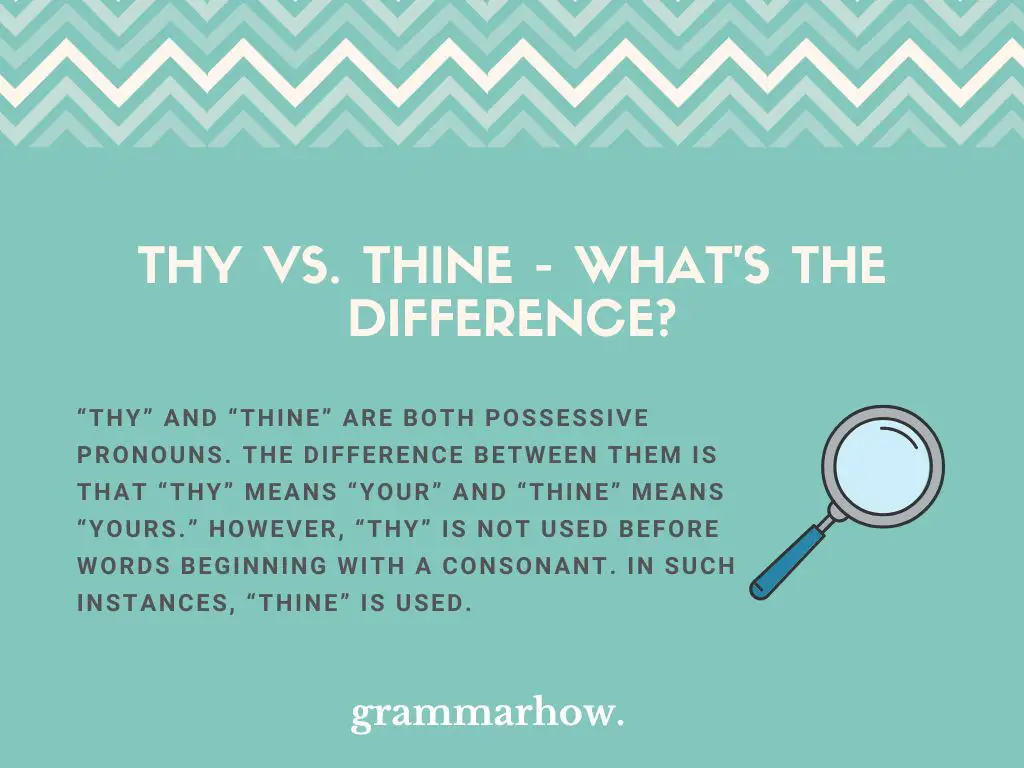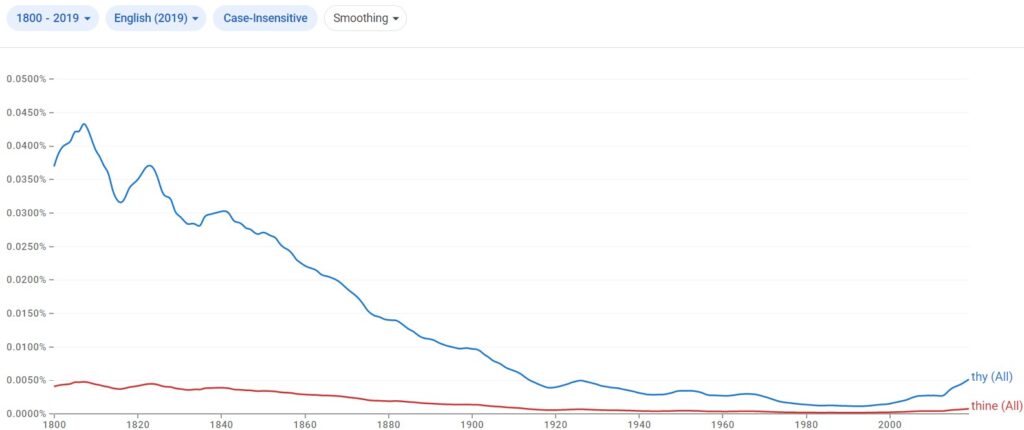The words “thy” and “thine” sound similar, but there is a difference that this page will explain and highlight with examples and definitions.
Thy vs. Thine – What’s the Difference?
“Thy” and “thine” are both possessive pronouns. The difference between them is that “thy” means “your” and “thine” means “yours.” However, “thy” is not used before words beginning with a consonant. In such instances, “thine” is used.

The Cambridge Dictionary states that “thy” is a determiner used to specify “your” to one person. The Collins Dictionary mentions that “thy” is a determiner and pronoun that means the same as “your” or “you.”
The Collins Dictionary and Cambridge Dictionary also state that “thine” is an archaic word for “yours.” Furthermore, “thy” is not used before vowel sounds, so in the case of something like “your eyes”, it would be said “thine eyes” rather than “thy eyes.”
When Should I Use “Thy”?
The Cambridge Dictionary states that “thy” should be used as a determiner or pronoun to refer to “your.” However, if the word following “thy” starts with a vowel sound, you should use “thine” instead.
Of course, there are examples of this rule being broken, and sometimes, especially in religious texts, the rules regarding “you”, “your”, and “yours” are often broken. Likewise, the same applies to “thy” and “thine.”
“Thy” is a perfectly correct term, although it has not been in widespread standard use since the mid-1800s. In some aspects, it is quite an old-fashioned, almost poetic way of saying “your”, but in others, it is used quite informally.
There are some parts of the world, such as the north of England, where “thy” is still used, although it is generally reserved for speech and informal messaging.
Here are some examples of “thy” in a sentence:
- Thy soul is what I have been seeking.
- I adore thy face and eyes.
- You need to control thy children.
- Thy blessing is all I ask.
- May all thy wishes be granted.
- Give your all to thy country.
When Should I Use “Thine”?
The word “thine” is in the Collins Dictionary and Cambridge Dictionary, which state that it is the plural pronoun or determiner “yours.” It is a perfectly correct term, although it has not been used much since the 19th century.
Furthermore, because the word “thy” cannot be used before vowel sounds, “thine” should be used instead also to mean “your.”
Here are some examples of “thine” in a sentence:
- Thine empire will not stand the test of time.
- Thine is the power which gives me light.
- Rub thine eyes and see the truth.
- The choice is thine; you can choose to do good.
- My dog is here but what about thine?
- Everything that is mine is thine.
Which Is Used the Most?
The Google Ngram shows that at the start of the 1800s, “thy” was very common in literature, and “thine” somewhat less so. After that, however, the frequency of “thy” fell dramatically and by around 1920 was rare.

Both “thy” and “thine” have remained uncommon, but they are still real words. Also, there has been a slight resurgence in the frequency of “thy” since 2000, possibly due to its inclusion in movies and video games.
The term “thy” is also used as a colloquial, informal term in the north of the UK, as well as a “poetic”, almost romantic, way of saying “you.”
Final Thoughts
The term “thy” means “your”, and the word “thine” means “yours.” However, “thy” cannot be used with vowel sounds, so “thine” can sometimes mean “your” and “yours.” Nevertheless, both are perfectly correct yet infrequently used terms that appear in dictionaries.
